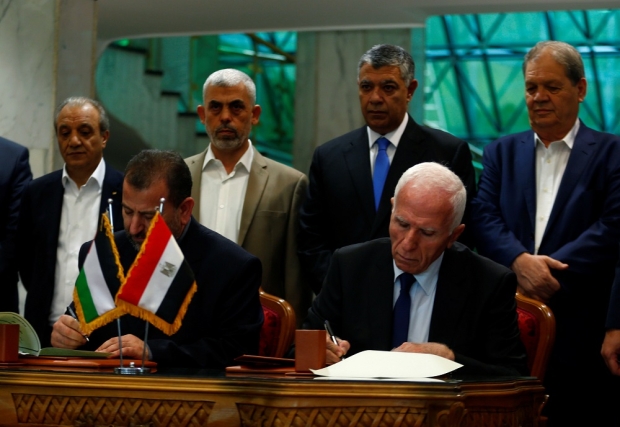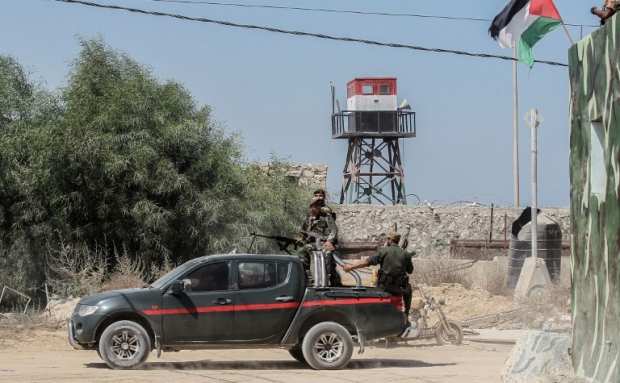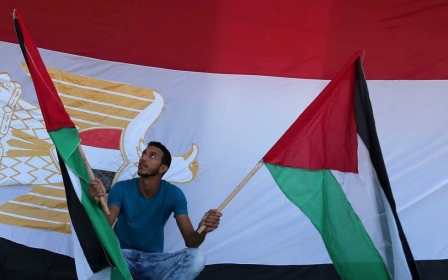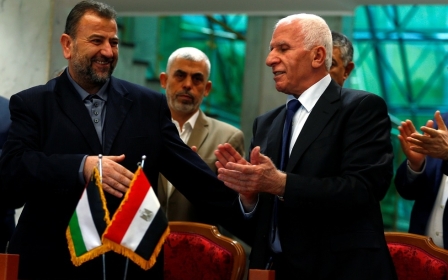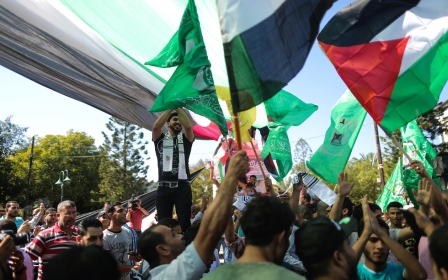REVEALED: How Gaza 'honey trap' fears almost sank Fatah-Hamas deal
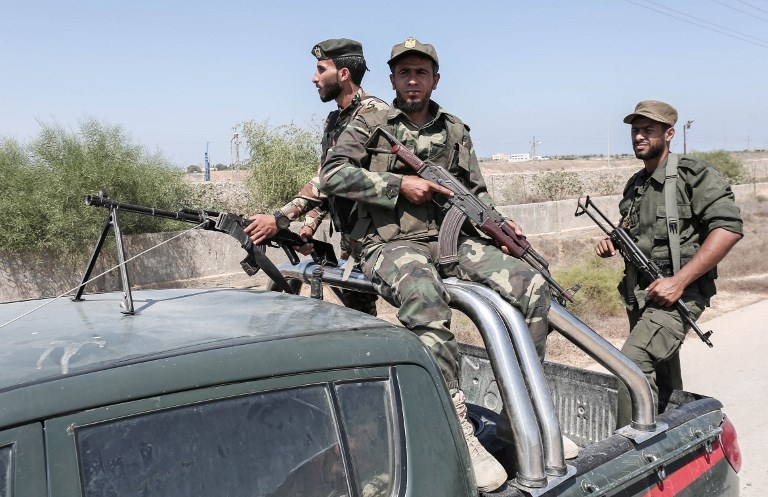
The Palestinian unity deal signed in Cairo last week between leaders of Fatah and Hamas almost collapsed at the last minute because of serious disagreements over security issues, Middle East Eye has learnt.
However, both sides agreed to postpone further discussions until the next round of negotiations in late November under pressure from Egyptian mediators who insisted that the rival parties signed Thursday's deal.
Sources on both sides of the discussions told MEE that talks had broken down over the future status of about 14,000 members of the security forces in Gaza which Fatah refused to include alongside 23,000 civil servants and 3,000 other security personnel in the enclave whose salaries are set to be paid going forward by the Palestinian Authority (PA).
Fatah controls the PA which currently runs the non-Israeli occupied areas of the West Bank, while Hamas has controlled Gaza since winning elections in 2006 and driving Fatah out in fighting in 2007.
Hamas insists that all of its security personnel should remain on the government payroll, but Fatah officials told MEE they feared that situation would amount to a "honey trap" in which Fatah was meeting the bill for a security force which gave Hamas de facto control of the strip.
The full text of the deal has not been made public, although about 3,000 PA police are expected to be deployed in Gaza and control of the Rafah crossing between Gaza and Egypt is expected to pass into PA control.
Officials told MEE the agreement also included the Fatah delegation agreeing to add 23,000 Hamas civil servants in Gaza to the government pay roll as well as 3,000 members of the security forces appointed by Hamas prior to its takeover of the strip.
Even if they take their salaries from the government, they will take orders from Hamas
- Fatah official
But a Fatah official said the party's delegates rejected Hamas's demand for a further 14,000 members of the security forces to also be included in the deal.
"We accepted having 3,000 security men appointed by the Hamas government before the takeover [in] June 2007, but vehemently rejected the 14,000 who were appointed after that date in five security apparatuses - the intelligence service, internal security, national security forces, blue police and the civil defence," a Fatah official said.
"If we accepted all these security officers, it would mean that Hamas would continue to rule Gaza even if it operates under the shadow of the government," he said.
"It's no secret that those security service staffers belong to Hamas and at the end of the day they will be reporting back to Hamas. Even if they take their salaries from the government, they will take orders from Hamas," he added.
Hamas from its side had insisted on keeping all security personnel on the government pay roll. It also insisted that the personnel, some of whom have high-ranking positions, retain their positions.
"Retaining the high ranks means they will be in leading positions in the new security apparatus that we plan to build, and that means keeping the real power in Gaza in Hamas’s hands, not in the government's hands," a Fatah official said.
Fatah is also concerned that many of the security personnel that Hamas wants to include in the deal have served in Hamas's al-Qassam Brigades and that having them on the payroll would cause problems for the PA government with its international donors.
The al-Qassam Brigades, which command an estimated 25,000 fighters and have fought three wars with Israel since 2008, are considered the most effective military force in the enclave.
But Hamas and its armed brigades are considered a terrorist organisation by the US and the European Union. The UK only lists the al-Qassam Brigades as a terrorist organisation.
Declaration of principles
Leaders of the two organisations last week publicly hailed the deal, with PA President and Fatah leader Mahmoud Abbas describing it as a "final agreement to end the division".
But many Palestinians expressed scepticism that the deal would lead to genuine reconciliation and officials spoken to by MEE acknowledged that it was more of a declaration of principles than a detailed agreement.
"It was an interim agreement that handles one issue: empowering the government. The major issues were postponed until the next round of talks scheduled for 21 November," a Hamas official told MEE.
These issues include continuing serious disagreements between the two rival parties over their partnership in the Palestinian Liberation Organisation (PLO), conducting future general elections and forming a national unity government.
There are also differences of opinion on each side over proposals to rebuild the National Council, the legislative body of the PLO, and to reactivate the Legislative Council, a parliamentary body covering the West Bank and Gaza which ceased to function as a consequence of the rift between Fatah and Hamas.
Hamas officials said they were relying on Egypt's involvement in the talks to help resolve some of these differences, while officials from both sides said they were optimistic but cautious.
Fatah told MEE that while Hamas's new leadership is more flexible, they were unsure of the extent to which they can agree with one another.
Both parties plan to hold further talks to discuss three main issues related to empowering the government: civil servants, border crossings and the security apparatus.
One point of continued contention appears to be the issue of when control of the Rafah crossing will pass from Hamas to PA control.
At a press conference following the signing of Thursday's deal, Azzam Ahmad, the head of the Fatah delegation, said that PA guards would be stationed at the border post by 1 November.
Rafah is a vital lifeline for Gazans as the only border crossing in and out of the strip that is not controlled by Israel, which has blockaded Gaza since 2007.
Egypt on Monday cancelled a scheduled opening of the crossing following an attack by IS-linked militants in Sinai in which seven Egyptian soldiers were killed.
"We agreed to hand over [control of] the crossings to the government. But at the Rafah crossing, for example, we will keep the intelligence and internal security offices functioning until we come to an agreement regarding the security apparatus issue," a Hamas official said.
In response to this comment, a Fatah official told MEE: "The government cannot accept that because it means Hamas is ruling the crossing."
New MEE newsletter: Jerusalem Dispatch
Sign up to get the latest insights and analysis on Israel-Palestine, alongside Turkey Unpacked and other MEE newsletters
Middle East Eye delivers independent and unrivalled coverage and analysis of the Middle East, North Africa and beyond. To learn more about republishing this content and the associated fees, please fill out this form. More about MEE can be found here.


